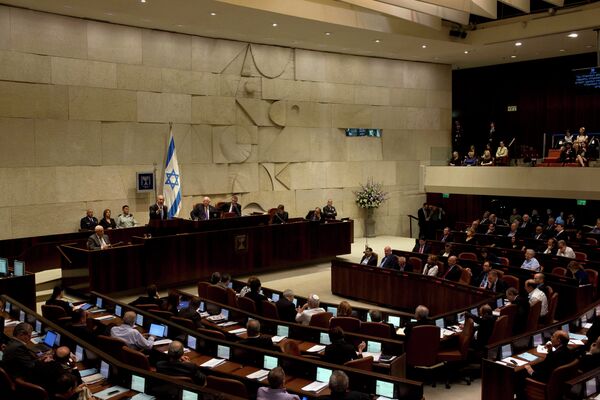On 25 September, Israeli President Reuven Rivlin asked Benjamin Netanyahu to form a coalition government after the Likud and Kahol Lavan-led blocs found themselves stuck in a stalemate in the aftermath of the 17 September vote.
Kahol Lavan (the Blue and White), a centre-left political alliance led by Benny Gantz, won 33 seats in the Knesset outperforming its major rival Likud by one seat. However, Likud's leader and longtime Prime Minister Netanyahu managed to receive 55 recommendations from Knesset members (MKs) while Gantz got only 54.
According to the Haaretz, to end the stalemate Rivlin suggested that Netanyahu and Gantz share the premiership, but Kahol Lavan's leader rejected the proposal, citing the possibility of his rival's indictment in the upcoming corruption hearing. Finally, Rivlin announced Netanyahu as his pick, giving him four weeks to form a government.
Netanyahu's First Shot and Gantz's Reported Tactical Move
Explaining President Rivlin's move Israeli political analyst and publicist Avigdor Eskin highlights that the chances for Benjamin Netanyahu to form a government are better than those of his opponent.
"He was endorsed by 55 Knesset members altogether, while his opponent Gantz has gained the support of 57 Knesset members only with one big 'but'", he noted referring to the Joint Arab List's flip-flopping over throwing their weight behind Gantz and finally leaving him with just 54 votes.
Nelly Gutina, an Israeli author and political commentator, has drawn attention to an apparent political game behind Gantz and the Joint List's "alliance".
"The Joint List, which is presenting the Arab citizens of Israel, for the first time decided to recommend one of the candidates", she says, stressing that it was an unprecedented move by the predominantly Arab party which has never supported any Israeli candidate.
The Joint List's leader, Ayman Odeh, explained in his 22 September op-ed for The New York Times that he had decided to support Benny Gantz "to prevent another term for Mr Netanyahu". However, less than a day after the publication of Odeh's op-ed three Arab MKs from the Joint List's Balad faction backpedalled on their decision to recommend the Kahol Lavan leader.
According to Gutina, there is particular controversy surrounding the Joint List's manoeuvre, as reports suggest that the Arab MKs did it at the Kahol Lavan's request.
"Some observers believe that Gantz deliberately ceded the right of making the first attempt to form a government to Netanyahu, in the hope that he would fail", she notes.
According to The Times of Israel, Ayman Odeh confirmed on Wednesday that Kahol Lavan had earlier approached the Joint List asking it to reduce support for Gantz as a tactical move aimed at ensuring Benjamin Netanyahu get the first crack at assembling a coalition.
"Why? Because Netanyahu will not succeed in forming a government and when the task will be given to the Blue and Whites afterwards, the parties will not want to go to third early elections, the public will not want them to, and will become angry… And at that moment, Gantz will be able to form a government", Odeh said, as quoted by the media outlet.

Current Situation is Weird for Israel
Eskin expressed doubts that the alleged Kahol Lavan's trick will work since the Joint List previously ruled out joining a governing coalition.
"The 13 Arab Knesset members were ready to give certain support to Gantz against Netanyahu, but made it clear that they will not join his coalition", he says "Thus we have [Likud's] 55 against [Kahol Lavan's] 44 [votes] at this moment".
He also points out that Avigdor Lieberman, the founder and leader of the secular nationalist Yisrael Beiteinu (Israel Our Home) won't join Gantz unless a national unity government is formed. Besides, there is no guarantee that President Rivlin will ask Kahol Lavan's leader to create a government if Netanyahu fails.
"The current situation is weird for Israel", Eskin says. "This is the first time in history we have elections with no clear cut results. Moreover, this was the case in May, and now we are facing it for the second time. We are certainly facing a constitutional crisis. Netanyahu is still the first, but his options are limited, and his chances are not clear".
The Israeli publicist elaborated that Netanyahu is bracing for the pre-indictment hearing which is scheduled for October 2-3. During the hearing, Israel's Attorney General Avichai Mandelblit will consider whether to charge the Prime Minister with bribery, fraud and breach of trust in connection with three cases known as 1,000, 2,000 and 4,000.
"This will be revenge by the ultraliberal judiciary system which sees Netanyahu as someone who desires to limit the courts and the prosecution hegemony in Israel", Eskin opines. "The debate is not around the rule of law as such, but the right of the Supreme Court to interfere in some Knesset political and moral decisions".
Conservative Agenda is Likely to Prevail in Next Knesset
Meanwhile, the president's decision to entrust the formation of the government to Netanyahu has not brought an end to hostility. Despite Netanyahu's calls for teaming up to form a broad unity government Gantz continues to hold his ground.
"We're not just 'Not Bibi'. We're looking to act against corruption and can't sit with a prime minister against whom there are active indictments", Gantz stated Thursday, blaming two snap elections in the past year on Netanyahu, and warning that his political rival may initiate a third vote.
Gutina highlights that "the parliamentary crisis is far from being resolved".
"It seems a mission impossible for both Netanyahu and Gantz to form a coalition in a situation where every potential coalition member is making the expulsion of the other a condition", she notes.
According to the Israeli commentator, President Rivlin outlined "the most logical and rational solution", namely the creation of the so-called national unity government; especially given the fact that the agendas of the two major blocs led by Likud and Kahol Lavan, do not differ much in terms of foreign policy and security issues.
"However, this logical and rational way out of the crisis is blocked by the irrational, obsessive hatred of the 'deep state' and mediacracy towards Netanyahu, comparable only to the hatred of the American' deep state' and mediacracy towards President Donald Trump", Gutina presumes.
Still, she points out that "the general balance of power [in Israel] is gravitating toward the right centre".
For his part, Avigdor Eskin believes that "the right-wing and the religious agenda will prevail in the next Knesset" agreeing that "the Kahol Lavan party is not much further left than Netanyahu, and the differences between them and the Likud are rather personal".




